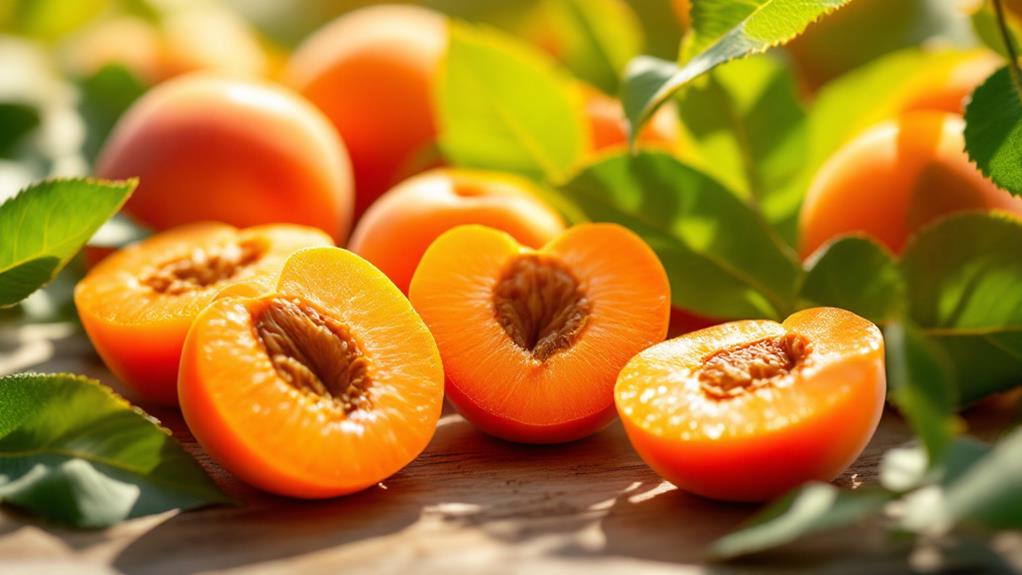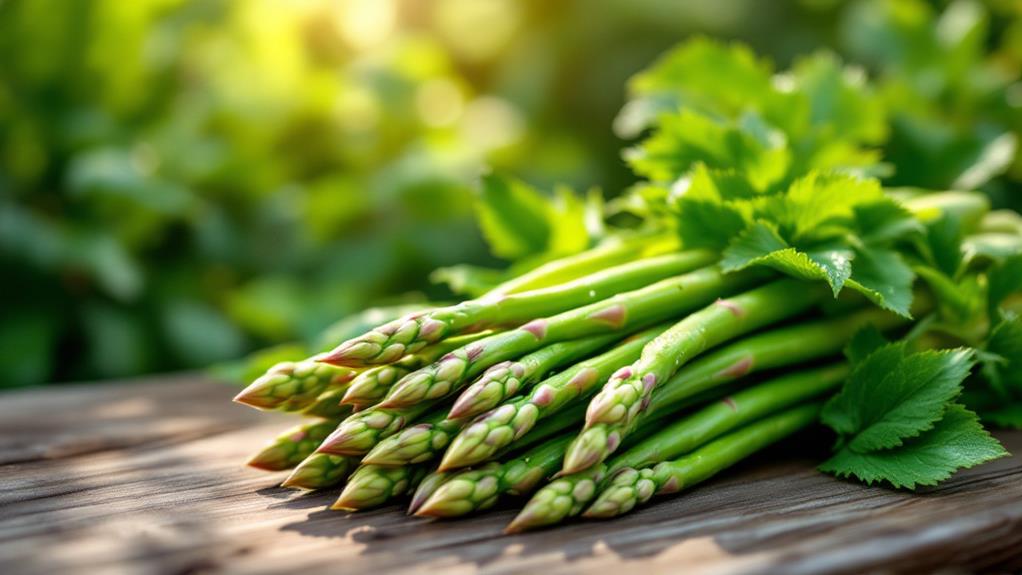A Comprehensive Guide to the Types and Benefits of Apricot

Apricots are small, lively fruits bursting with nutrients and flavor. They're low in calories but rich in vitamins, particularly A and C, which enhance immunity and skin health. Packed with dietary fiber, apricots aid digestion and regulate blood sugar. Their high potassium content supports heart health by managing blood pressure. Antioxidants in apricots help reduce oxidative stress and lower the risk of chronic diseases like heart disease and diabetes. You can enjoy them fresh, in salads, or dried in assorted dishes. Curious about the types and culinary uses or how apricots benefit your body? There's more to uncover.
Nutritional Profile of Apricots
When you're looking for a nutritious and guilt-free snack, apricots might just be the answer. These delightful fruits are low in calories, offering only about 16.8 calories per 35g serving. This makes them a fantastic choice for those watching their calorie intake. But don't let their small calorie count fool you—apricots are packed with nutritional content. They're rich in vital vitamins, including vitamin A and vitamin C. With 3.5mg of vitamin C per serving, apricots can elevate your immune system and support skin health.
Beyond vitamins, apricots are a fiber powerhouse. Each serving contains around 0.7g of dietary fiber, promoting digestive health and ensuring regular bowel movements. Fiber is fundamental for maintaining a healthy digestive system, and apricots deliver it in a delicious package.
Additionally, apricots provide about 90.6mg of potassium per 35g serving, which helps regulate blood pressure and supports heart health. The antioxidants present in apricots, such as flavonoids and carotenoids, further contribute to their health benefits, protecting your body from oxidative stress. Regardless of whether you're snacking or incorporating them into meals, apricots are a tasty way to improve your diet.
Health Benefits Overview
Apricots offer a multitude of health benefits that make them a valuable supplement to your diet. Packed with vitamins A and C, apricots support your immune function, helping your body fend off illnesses more effectively. Vitamin A also plays a significant role in maintaining your vision health, while vitamin C aids in skin protection from UV damage and aging. With their rich content of dietary fiber, apricots promote healthy digestion and assist in regulating blood sugar levels, which is vital for general health.
The high potassium content in apricots contributes to maintaining healthy blood pressure, supporting your cardiovascular health. This mineral helps balance bodily fluids and guarantees your heart functions at its best. Furthermore, apricots are loaded with antioxidants, including flavonoids and carotenoids, which can reduce oxidative stress and lower the risk of chronic diseases such as heart disease and diabetes. These antioxidants work to neutralize harmful free radicals in your body, offering a protective effect.
Regular consumption of apricots may also bolster bone health due to important minerals like calcium and magnesium. In addition, their anti-inflammatory properties can help reduce the risk of chronic illnesses, making apricots a fantastic choice for a health-conscious diet.
Culinary Uses of Apricots

Beyond their impressive health benefits, apricots shine in the culinary world with their versatility and delightful flavor. You can enjoy fresh apricots as a quick snack, adding a burst of natural sweetness and a fiber lift to your day. Slice them into salads for a revitalizing twist or blend them into smoothies to improve both nutrition and flavor. Dried apricots are similarly convenient, making a tasty supplement to oatmeal, yogurt, or trail mixes.
Incorporating apricots into your recipes is a surefire way to raise your dishes. Their sweet and tart flavor profile works wonders in jams, preserves, and baked goods like pies and tarts. They also excel in savory culinary applications, such as apricot-glazed meats or inventive salsa recipes. When baking, apricots can seamlessly replace peaches or plums in muffins and breads, adding a unique twist.
Here are a few simple ideas to inspire you:
- Add sliced apricots to your morning cereal or oatmeal for a sweet start.
- Use apricots in homemade trail mix for a fiber-rich snack.
- Try apricot-glazed chicken for a deliciously sweet and savory dinner.
Embrace apricots in your culinary adventures!
Different Apricot Varieties
Exploring different apricot varieties can improve your appreciation for this delightful fruit. Each variety boasts unique flavors and characteristics that cater to an array of culinary uses. Blenheim apricots, for instance, are cherished for their rich flavor and sweet taste, making them perfect for fresh consumption and desserts. If you're into canning and preserves, Tilton apricots, with their slightly tart flavor and firm texture, are your best bet.
Moorpark apricots stand out with their large size and sweet, juicy flesh. They're often favored for fresh eating and baking, enhancing the taste of any dish. Then there's the Hacıkız variety from Malatya, a standout due to its high total phenolic content. This contributes to its exceptional antioxidant properties and health benefits, making it a nutritious choice.
Understanding these apricot varieties helps you select the best type for your culinary needs, regardless of whether you're looking to enjoy them fresh, preserve them, or bake them into something delicious. Each variety not only offers distinct flavors and textures but also contributes differently to your health, thanks to their unique antioxidant properties.
Apricot Storage Tips

Proper storage of apricots is key to maintaining their delicious flavor and nutritional value. Start by keeping fresh apricots at room temperature until they're perfectly ripe. Once ripened, transfer them to the refrigerator to extend their freshness for up to a week. This simple step helps preserve both their taste and quality.
For dried apricots, an airtight container is your best friend. Store them in a cool, dark place to prevent moisture absorption and maintain their quality over time. If you've got more apricots than you can eat right away, consider freezing them. Blanch fresh apricots before placing them in freezer bags. This method allows you to enjoy their flavor and nutrients for up to six months.
When dealing with cut or sliced apricots, a splash of lemon juice can work wonders. It prevents browning and keeps them looking appetizing while refrigerated.
To keep spoilage at bay, regularly check your stored apricots for signs of mold or off smells. Remove any affected fruits immediately to avoid contamination.
- Room Temperature: Store fresh apricots until ripe.
- Airtight Container: Crucial for dried apricot storage.
- Freeze: Preserve fresh apricots' flavor and nutrients.
Apricots and Skin Health
Now that you've mastered storing apricots, let's look at how these fruits can improve your skin health. Apricots are packed with vitamin A and antioxidants, fundamental for promoting skin cell regeneration and shielding your skin from UV damage. This protection can help reduce signs of aging, like wrinkles and fine lines. The vitamin E in apricots plays a significant role in maintaining your skin's moisture and elasticity, giving you a smoother, healthier complexion.
Antioxidants, including beta-carotene and flavonoids, combat free radicals, preventing oxidative stress that can lead to skin damage and premature aging. By regularly eating apricots, you can elevate your skin's hydration, thanks to their high water content. This extra hydration is imperative for maintaining comprehensive skin health, keeping it supple and radiant.
Furthermore, apricots possess anti-inflammatory properties that can soothe skin irritations, providing relief if you struggle with conditions like eczema and acne. By incorporating apricots into your diet, you can improve your skin's resilience and appearance. So, enjoy these delicious fruits and let their natural benefits work wonders for your skin health, ensuring you look and feel your best.
Apricots for Heart Wellness

Bite into an apricot, and you're not just enjoying a sweet treat—you're supporting your heart's health. Apricots are a powerhouse of nutrients that bolster cardiovascular health. With their rich potassium content of approximately 259mg per 100g, apricots help regulate blood pressure, a vital factor in maintaining heart health.
The high fiber content in apricots, about 7.1g per 100g, plays a significant role in lowering cholesterol levels. This reduction is important in minimizing the risk of heart disease. Their antioxidants, including vitamins A, C, and E, combat oxidative stress, which is associated with numerous heart health issues. Regularly incorporating apricots into your diet can have profound effects on your cardiovascular wellness.
- Potassium-rich: Helps regulate blood pressure.
- High in fiber: Aids in lowering cholesterol levels.
- Antioxidants: Combat oxidative stress and inflammation.
Moreover, the anti-inflammatory properties of apricots contribute to improved vascular function, further enhancing heart health. By including apricots in a balanced diet, you're not only nourishing your body with vital nutrients but also promoting healthy blood circulation. This can potentially lower the risk of stroke by up to 24%, offering a delicious way to care for your heart.
Apricot Delight Recipe
Apricot Delight's charm lies in its simplicity and rich flavors, making it a must-try treat. Start by soaking 2 cups of dried apricots in water, then simmer them until they soften into a sweet, chewy base. This core ingredient not only provides a delightful taste but also packs dietary fiber and antioxidants, offering numerous health benefits. The versatility of dried apricots shines here, as they blend seamlessly with other ingredients.
To create a perfect mix of textures and flavors, add 1 cup each of sugar, chopped nuts, and shredded coconut. These elements complement the apricots wonderfully, providing a crunchy contrast to the chewy base. A teaspoon of vanilla extract adds an irresistible aroma and improves the general taste of the delight.
Once everything is cooked and combined, shape the mixture into either balls or squares. For an extra touch, dust them with powdered sugar before serving. This simple yet delicious recipe showcases how dried apricots can transform into a versatile and healthy treat. Regardless of you're indulging in a sweet snack or sharing with friends, Apricot Delight is sure to impress with its blend of natural goodness and enticing flavors.




